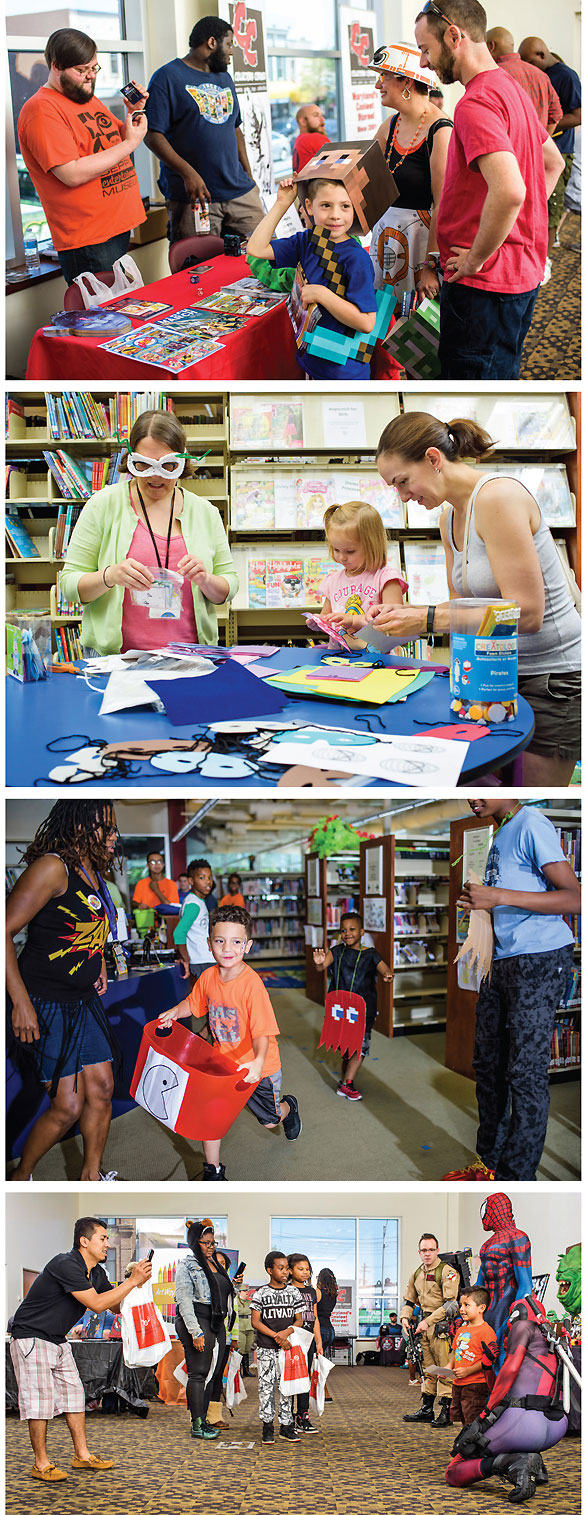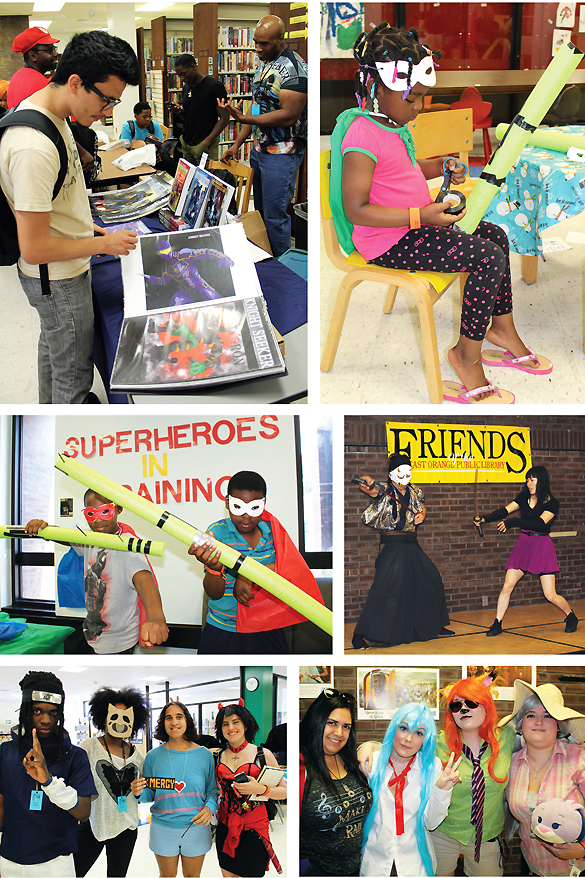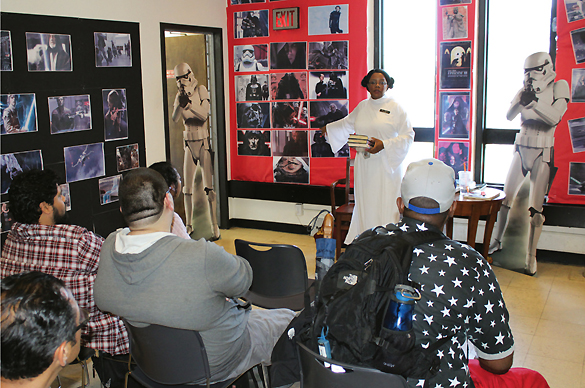The Pros of Cons

With a slew of superheroes getting the big screen treatment in recent years, comic books are gaining even more cachet as a cultural touchstone. Big-budget blockbusters and critically acclaimed TV spin-offs have helped to spawn a new generation of comic book fans and reignited the spark in former readers, while alternative titles bring in fans who aren’t the superhero type (see Picture the Possibilities). Meanwhile, sf has long since gained mainstream acceptance without losing its ability to stir deep devotion (witness the plethora of Doctor Who merchandise), and anime and manga are reaching ever-larger portions of the American populace, particularly among teens and new adults. Board and card games, too, are seeing a dramatic resurgence in popularity alongside their high-tech counterparts, and once under-the-radar fanfiction and fan art are now far more widely known and accepted.
For librarians looking to bring in new users, especially among teens and sometimes-elusive childless patrons in their 20s and 30s; energize their base of existing passionate readers; shake any lingering remains of a stodgy stereotype; and build goodwill with the community, staging a con can be a great opportunity.
Putting together high-profile events with attendees in costume or looking for autographs from celebrities can be daunting, however, especially with limited space, time, and budget. More and more librarians, though, are getting comfortable with running cons—not least because many of them are attendees themselves. On any given weekend, libraries nationwide are hosting cons large and small, general or tightly focused, aimed strictly at teens or for all ages. LJ asked librarians who have hosted their own cons to weigh in on what make makes a geeky gathering great and how one busy day can help a branch reach a whole new demographic.
Why stage a con?
One of the most frequent frustrations of librarians is that patrons, or potential patrons, don’t know what the library offers and don’t think to check, even when it relates directly to their interests. Throwing a con can help change that perception. Readers sometimes don’t see their local library as a place they can go to for their manga fix, for instance.
“We’ve noticed a growing interest in comic books, manga, and fandom culture and wanted to offer our patrons a place where they could come and celebrate their inner nerd,” says Naomi Magola, youth services manager at Terrebonne Parish Public Library, LA.

Baltimore’s Enoch Pratt Free Library (EPFL) hosted PrattCon 2016, a pop culture extravaganza with vendors and attendees exchanging game theories (top); children’s librarian Carrie Harnick (l.) unmasked young patrons’ creative sides at the “create your very own superhero mask” workshop (2nd row); and with the assistance of children’s librarian Kelly Burden (l.), kids gobbled up a life-size Pac-Man game at EFPL’s Southeast Anchor Branch (3rd row). Fans perused the vendors space and had photos taken with costumed superheroes (bottom). Photos by Matt Roth
Cons can be a great service for libraries to provide in rural communities, where traveling to an existing con may not be an option—especially for teens too young to drive.
“New Orleans, which is about an hour away, has a large Wizard World Comic Con every year that a lot of folks in our parish attend, but trying to find a ride and the money to go makes it a nonstarter for many, Magola tells LJ. “We decided that we were in the unique position to offer a closer, free version right here at home.”
Whether to focus on a single narrow subculture (just anime, say) or cast a wider net depends on the library’s goal for the event. Are you trying to publicize a new collection? Fill a void in local offerings? Energize your teen volunteers by appealing to their passions?
For example, Justin Switzer of Baltimore’s Enoch Pratt Library uses the con concept to drive participation in the library’s summer reading program, so he always develops the library’s cons around the program’s annual central theme. This year’s theme was Game On!, a natural fit. Next year, with an architecture theme, Switzer is planning to include LEGO. If you don’t have a strong preference, the range can be pragmatically determined by the base of knowledge and potential help and guests the library has to draw on—and how much space with which it has to work.
Panel power
Panel discussions by experts—often a mix of industry professionals and knowledgeable amateurs—are a keystone of any successful con, and geek gatherings at the library are no exception. Hosting a wide variety of panels can ensure that your con has a little something for everyone, bringing aspiring artists and writers, die-hard Trekkies, and Star Wars loyalists all into one big tent.
Local specialists who can present these panels are likely closer at hand than you think. Librarians who have organized their own conventions all recommend reaching out to library staff and volunteers in the early planning stages. Chances are a lot of connections to local fandom communities exist within your library system, untapped. A short email to the folks already helping out every day can be a great place to start booking local experts on comics, gaming, sf, and more.

ToshoCon, at the East Orange PL, NJ, featured vendors such as Seeker Entertainment offering collectibles and, of course, books (top); sword-making sharpened up the interactive samurai presentation (top r. and middle); and costumed attendees made the most of a chance to out-grown-up the grown-ups (bottom). Photos by Kevin Henegan
Tap into your teen advisory board, if you have one, for planning help as well. Marissa Lieberman, junior services librarian at the East Orange Public Library (EOPL), NJ, is the chair and Founder of ToshoCon, now held at EOPL. Lieberman originally started the con (from the Japanese toshokan, meaning library) at her previous library job, in collaboration with a young adult anime club she had founded. When EOPL chose to revive the con, members of the library’s tween anime club also assisted in the design and ran their own table at the event. They even served as guest liaisons. Lieberman also convened a planning committee of library staff—librarians and paralibrarians alike—off of which to bounce ideas.
Once you’ve exhausted internal resources, if more panelists are needed, reach out to any local organizations that set up their own conventions, owners of comic and gaming stores, and fan groups from local schools and colleges.
While media celebrities often charge appearance fees that are out of a library’s league, authors may come for free or nothing more than reimbursement for food, travel, and lodging—and many major media properties have spun off a series of popular tie-in books, whose publishers’ library marketing departments can help schedule author appearances.
It might also be worth exploring whether any desirable guests have family or other connections to your area, or are coming to your area for other reasons in the applicable time period—an add-on appearance to an already scheduled trip is often cheaper and more feasible than a stand-alone. Virtual appearances via live video hookup could be an option as well.
In addition to panels analyzing the appeal of popular titles, content for aspiring creators is often a draw, whether it’s hands-on workshops on how to create and edit their own stories, comics, or even short films, or advice on how to market and sell the results.
Other programming ideas include fandom-themed crafts, such as ToshoCon’s comic collages, and screenings. While the ideal jackpot is a piece of not generally available content, whether because it’s not yet released or old and hard to find, fan favorites can also work, especially ones such as musical episodes that have an audience participation component. Just remember to have your public performance rights squared away: owning a DVD for lending purposes is a different copyright case from hosting a group showing. ToshoCon even hosted a samurai sword demonstration, prompting something else to check on: insurance.

Photo booth fun with attendees savoring their five minutes of fame at CRRL-con at the Central Rappahannock Regional Library, Fredericksburg, VA. Photos courtesy of CRRL
When scheduling your con, keep in mind that not every panel will appeal to every attendee, says Sarah Bean Thompson, youth services manager at the Library Center in Springfield, MO. The people who join you will make their own schedules, based around their own interests. “We learned that scheduling around breaks and lunches doesn’t matter, as people will take breaks and eat when they want to. What they want is panel after panel,” Thompson tells LJ.
Masks, armor, and more
Attendees dressing as their favorite costumed characters from comics, TV shows, and movies has long been a pillar of con culture, but, in recent years, costumed couture has become more important than ever. A costume contest can ensure people will be dressed to the nines, and the sight of costumed characters can make your con feel like a special event—as well as attracting local press.
To guarantee that a few heroes are on hand, encourage your staff and volunteers to trade in their day wear for a spandex suit and attend the con dressed as their favorite four-color phenoms. Of course, comics aren’t the only thing that inspires cosplay—some attendees would rather come as their favorite video game villain, Enterprise crew member, TV vampire hunter, or anime alien.
“We encouraged everyone to dress up that day, and the patrons loved that Poison Ivy, Bat Girl, and Freddy Krueger checked their books out,” says Magola. Libraries can also tap into the Maker movement by running costume-creation workshops in the weeks leading up to the convention.
For those running a con that is broad enough to attract comics and sf enthusiasts alike, consider reaching out to the 501st Legion, a dedicated group of Star Wars cosplay devotees who can put you in touch with Stormtroopers and Sith Lords near you. A nonprofit that bills itself as “bad guys doing good,” the 501st presents its members for free, though cons are invited to make a contribution to one of the many charities the group supports.
In recent years, the 501st has noticed a definite uptick in the number of library events at which they are asked to appear, says spokesperson Josh Mueller. Costumed representatives from the organization appear at hundreds of library events annually, and with more than 8,000 members, chances are there’s a Stormtrooper patrol around the corner.
“We love these events as they allow us to interact with other Star Wars fans while doing good works,” Mueller says. But there are a few things that libraries can keep in mind to increase their odds of getting the Legion to put in an appearance.
“Plan out your scheduling carefully. We are often given a difficult event time, such as 1 p.m. on a Tuesday, when most of our members are at work, or dozens of libraries in a given area will schedule their events at the same time,” Mueller tells LJ. “We try to make as many events as possible, but our volunteers are often stretched thin.”

The Star Wars Nook at East Orange PL’s ToshoCon 2016 (above), the brainchild of cosplayed reference librarian
Nancy Tinney. Photo by Kevin Henegan
Besides being tons of fun, cosplay can help send a message of inclusion. Lieberman told LJ’s sister publication School Library Journal, “One of my favorite moments of the convention was when a parent from our community…said she was grateful that we created an accepting environment and had representation from industry professionals who helped model to African American children that they should feel comfortable cosplaying and can be a part of the comics industry.” (For more, see The Epicenter of Geek Culture: Planning a ‘Con’ at the Library.)
Vendors, assemble!
A con is a great opportunity to reach out to comic book stores, regular bookstores, gaming and hobby shops, and other vendors in your area to offer merchandise as well as panel expertise.
The chance to peruse and purchase back issues, books, and memorabilia from multiple shops all in one place can be a great attraction for attendees, but it doesn’t have to stop there. Demonstrations or tournaments for board games and video games can help bring in crowds. For larger events, an “artists alley” for independent comics creators can be a draw.
Partners such as these can provide free word of mouth promotion for the event that is targeted to the people most likely to be interested. They also often have insight into the community that library staff may not and can be helpful consultants on programming choices.
“We had 26 vendors who did everything from selling original artwork to displaying collections to selling comic book–themed food to selling comic books and paraphernalia,” says Christie Hoerneman, head of research at the England Run Branch of Virginia’s Central Rappahannock Regional Library, which saw 1,400 attendees at its first con in April 2015. “The convention was a huge success because of the people we were able to bring in as vendors, some of whom traveled from up to an hour away. We didn’t charge any vendor fees, which we were told was very helpful.”
Also note that many comic book and game retailers travel to at least a couple of cons annually. To ensure you get a strong showing from vendors, start planning early and don’t conflict with other events in the region, says Magola.
Cons can also be hungry work, so have lots of options on hand. Since many attendees will be around for at least a few hours, allowing them to eat on-site is a good idea, and local restaurants and food trucks will most likely be happy to assist.
Beyond the big day
Cons are not a quick, easy, or cheap program to organize, but the payoff for the library can be huge. “I do see some return on investment with patrons returning to use the library and an increase in young people signing up for summer reading,” says Enoch Pratt’s Switzer.
It’s not just patrons, either. “A number of vendors and attendees have become more frequent visitors to the library, and through these events, we develop lasting partnerships,” says Switzer. “For example, toward the end of Saturday’s event, the owner of Canton Games approached me to discuss having a regularly scheduled board game program here in the library.”
A successful con combines the exuberant enthusiasm of fandom with the convening power of libraries to create one super experience.
Cosplay, Consent, & Codes of Conduct
Cosplay contests are a great way to get patrons engaged. But they take some advance work before you roll out the red carpet. Reminders need to be in place that being in costume is not a license for other attendees to ogle or photograph cosplayers without permission. Harassment has plagued larger fan-run and for-profit conventions, leading to explicit educational efforts before and at-con around developing a culture of respect and consent.
Nor is harassment the only issue cosplay can raise: while a space marine may be welcome at your con, their model firearm could be cause for concern, especially if it looks like the real thing and community members are on alert for threats of a mass shooter. To head potential problems off at the pass, it’s important to have a set of well-thought-out ground rules in place ahead of time and clearly on display and to enforce them consistently.
While this may seem like less of an issue for a small convention with a local draw, attending to these safety measures will go a long way toward making cosplayers feel secure and welcome to wear their finest at your event—as well as helping prepare attendees who may want to graduate to larger cons in future.
Editor in chief of TheNerdyBird.com, Jill Pantozzi has assisted in the development of codes of conduct for conventions including New York Comic Con.
“Whether you’re a small convention or the largest convention, having a code of conduct is just smart policy,” says Pantozzi. “You want your attendees to have a fun time, but having a safe time is equally as important.”
The good news is you don’t have to start from scratch. When creating a code of conduct, Pantozzi recommends drawing from existing codes, which can be modified to suit your needs. New York Comic Con’s antiharassment policy is a good place to start, she says, as is the code of conduct for GeekGirlCon.
RELATED
ALREADY A SUBSCRIBER? LOG IN
We are currently offering this content for free. Sign up now to activate your personal profile, where you can save articles for future viewing









Add Comment :-
Comment Policy:
Comment should not be empty !!!